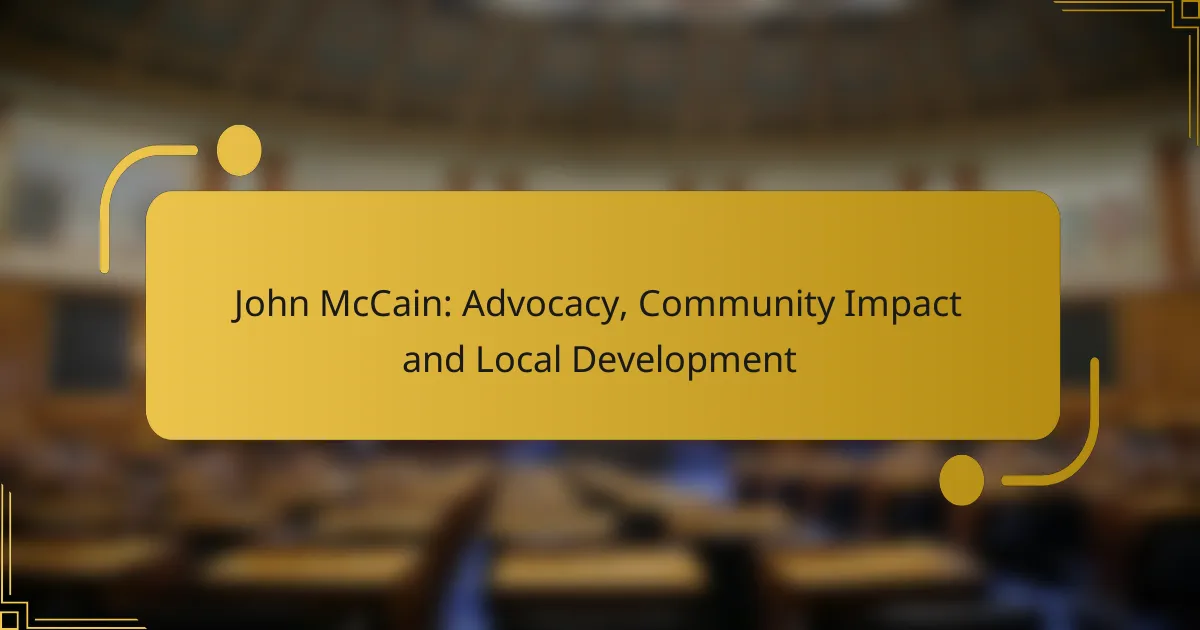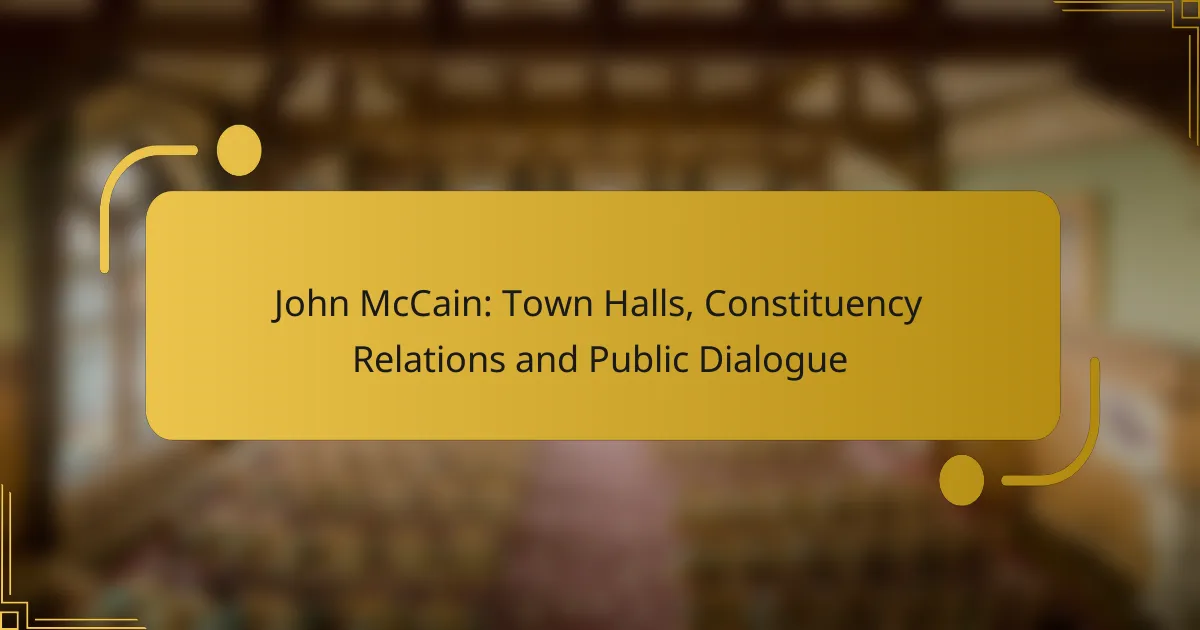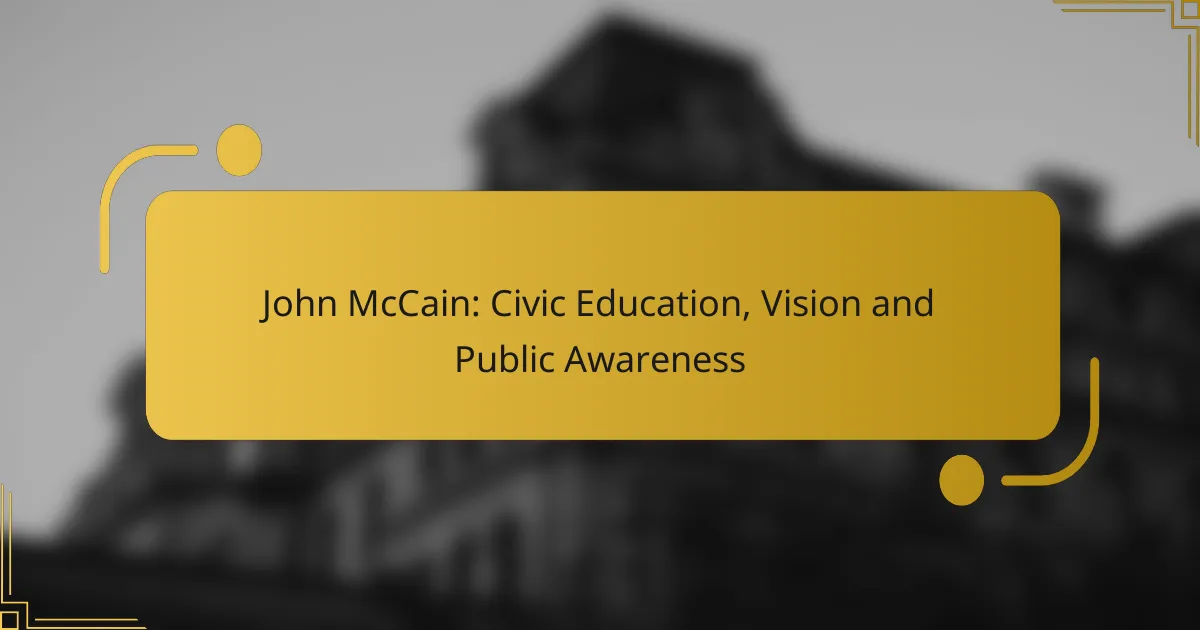John McCain’s advocacy efforts left a profound mark on local communities, particularly through his focus on veterans, education, and healthcare. His initiatives aimed to uplift underserved areas, enhance quality of life, and foster civic engagement, while also addressing broader issues like campaign finance reform and environmental conservation.
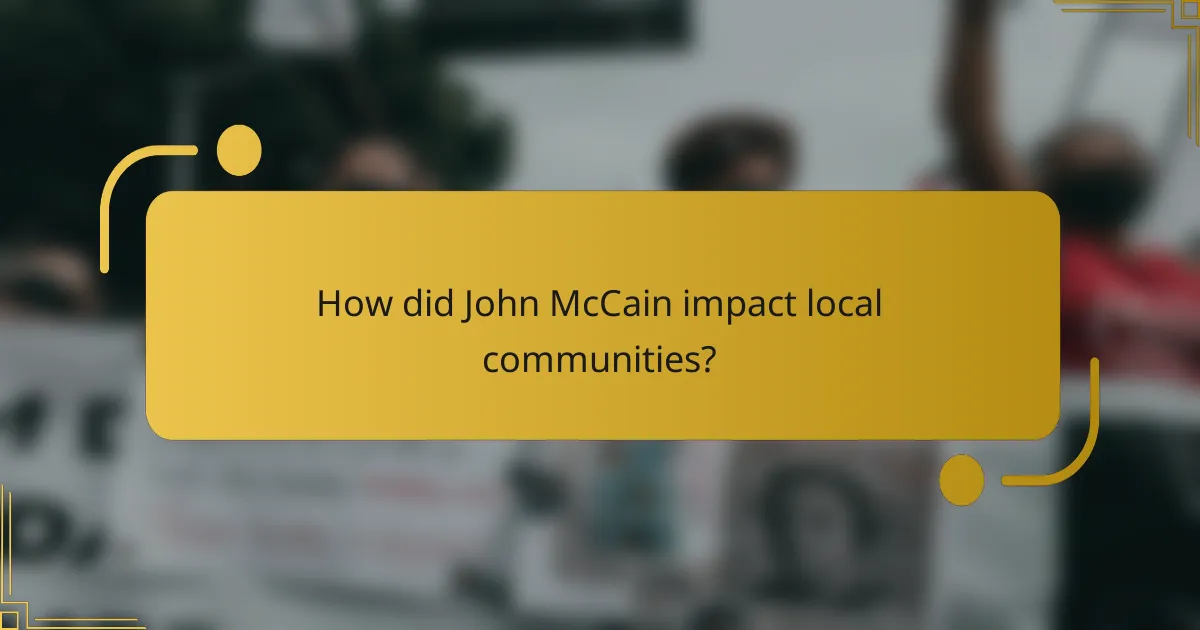
How did John McCain impact local communities?
John McCain significantly impacted local communities through his advocacy efforts, focusing on veterans, education, and healthcare. His initiatives aimed to enhance the quality of life for residents, particularly in underserved areas.
Advocacy for veterans’ services
John McCain was a staunch advocate for veterans’ services, pushing for improved access to healthcare and benefits for those who served in the military. He worked to ensure that veterans received timely medical care and support, addressing issues like long wait times at VA facilities.
His efforts included legislation that aimed to streamline the claims process and increase funding for veterans’ programs. By championing these causes, he helped raise awareness about the challenges veterans face, fostering community support for local veteran organizations.
Support for education initiatives
McCain’s support for education initiatives focused on increasing funding for public schools and promoting school choice. He believed that every child should have access to quality education, regardless of their background or location.
He advocated for programs that provided resources for low-income schools and supported charter schools as alternatives to traditional public education. His initiatives aimed to empower parents and improve educational outcomes for students in local communities.
Promotion of healthcare access
John McCain was a key proponent of expanding healthcare access, particularly in rural and underserved areas. He recognized the importance of affordable healthcare and worked to enhance insurance coverage options for families.
His legislative efforts included support for the Affordable Care Act, aiming to reduce the number of uninsured individuals. McCain’s focus on healthcare access helped bring attention to local health disparities, encouraging community leaders to advocate for better health services.
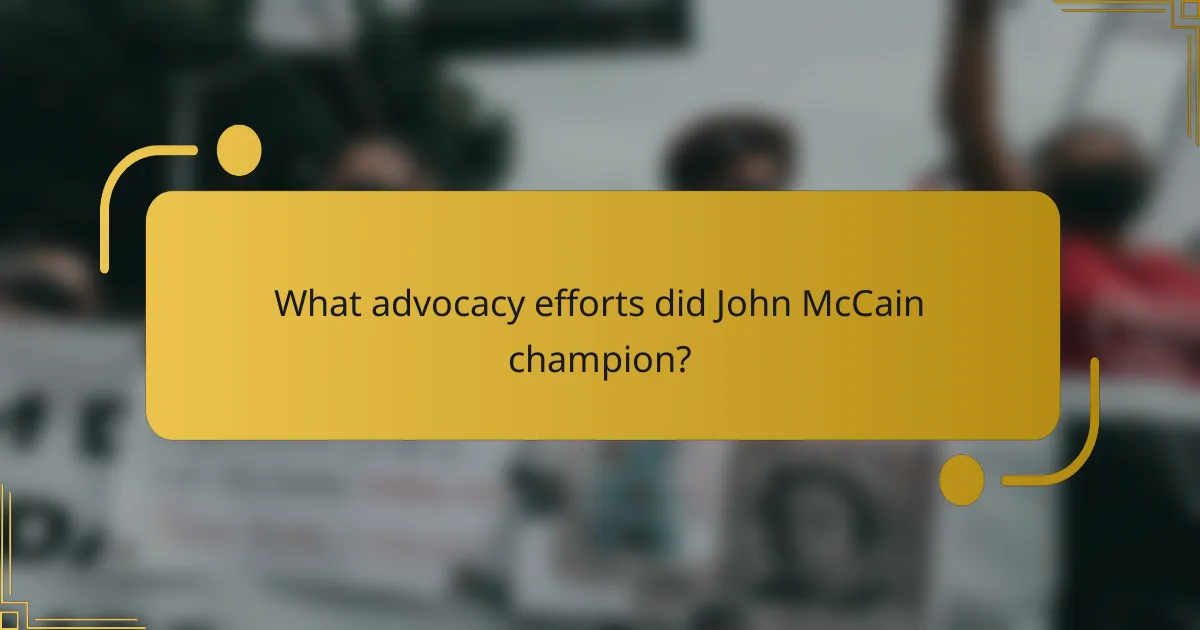
What advocacy efforts did John McCain champion?
John McCain was known for his commitment to various advocacy efforts, focusing on campaign finance reform, immigration reform, and environmental conservation. His work aimed to create lasting impacts on American society and policy, often emphasizing bipartisan cooperation.
Campaign finance reform
McCain was a leading voice in campaign finance reform, advocating for legislation that aimed to reduce the influence of money in politics. He co-sponsored the Bipartisan Campaign Reform Act, which sought to limit soft money contributions and increase transparency in campaign financing.
Key aspects of his advocacy included promoting stricter regulations on political donations and enhancing disclosure requirements for campaign contributions. This reform was intended to empower voters and ensure fairer electoral processes.
Immigration reform
John McCain played a significant role in immigration reform, supporting comprehensive approaches that balanced border security with a pathway to citizenship for undocumented immigrants. He believed in addressing the complexities of immigration through bipartisan legislation.
His efforts included co-authoring the McCain-Kennedy bill, which proposed a framework for legalizing the status of millions of undocumented immigrants while strengthening border enforcement. McCain emphasized the importance of humane treatment and economic contributions of immigrants to the U.S.
Environmental conservation
McCain was an advocate for environmental conservation, recognizing the need for sustainable policies to protect natural resources. He supported initiatives aimed at combating climate change and promoting renewable energy sources.
His advocacy included backing legislation to reduce greenhouse gas emissions and investing in clean energy technologies. McCain often highlighted the economic benefits of environmental stewardship, arguing that a healthy environment is crucial for long-term prosperity.
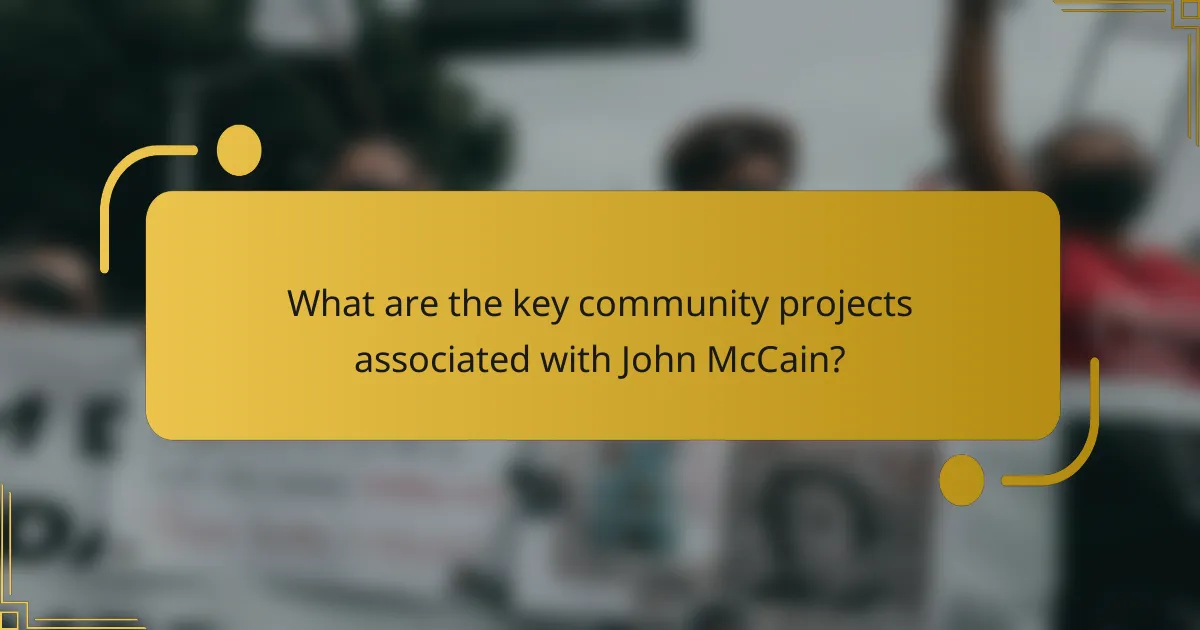
What are the key community projects associated with John McCain?
John McCain was involved in several significant community projects that aimed to enhance local development and foster international leadership. His initiatives primarily focused on education, support for local businesses, and promoting civic engagement in Arizona.
McCain Institute for International Leadership
The McCain Institute for International Leadership, founded in 2012, is dedicated to advancing leadership and promoting global engagement. It offers programs that focus on developing leaders in various fields, including public service, business, and academia.
Key initiatives include the Next Generation Leaders program, which supports young leaders from around the world through mentorship and training. The institute also hosts events and discussions on pressing global issues, encouraging dialogue and collaboration among diverse stakeholders.
Support for local businesses in Arizona
John McCain actively supported local businesses in Arizona through various initiatives aimed at economic development. His efforts included advocating for policies that promote entrepreneurship and reduce regulatory burdens on small businesses.
McCain’s focus on local economic growth involved collaborating with community organizations to provide resources and training for entrepreneurs. This included access to funding opportunities and business development workshops, helping to create a more vibrant local economy.
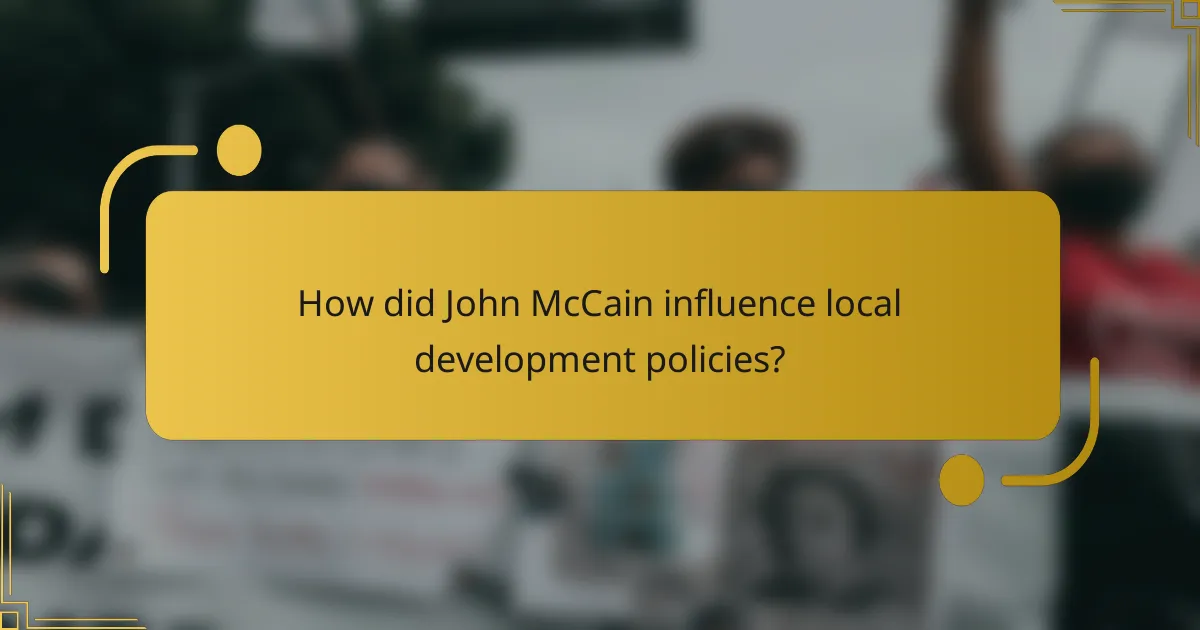
How did John McCain influence local development policies?
John McCain significantly influenced local development policies through his advocacy for infrastructure improvements and affordable housing initiatives. His efforts aimed to enhance the quality of life in communities, particularly in Arizona, by addressing critical needs and fostering economic growth.
Infrastructure improvements in Phoenix
McCain championed various infrastructure projects in Phoenix, focusing on transportation and public utilities. His support for expanding highways and public transit systems aimed to reduce congestion and improve accessibility for residents.
Key projects included the development of light rail systems and enhancements to major roadways, which facilitated better connectivity within the city. These improvements not only boosted local economies but also attracted new businesses to the area.
Affordable housing initiatives
McCain was a strong advocate for affordable housing initiatives, recognizing the growing need for accessible living options in Phoenix. He supported policies that aimed to increase the availability of low-cost housing, which is crucial for low- and middle-income families.
His initiatives often included partnerships with local developers and non-profit organizations to create housing projects that met community needs. By promoting these efforts, McCain helped ensure that residents had access to safe and affordable homes, contributing to overall community stability and growth.
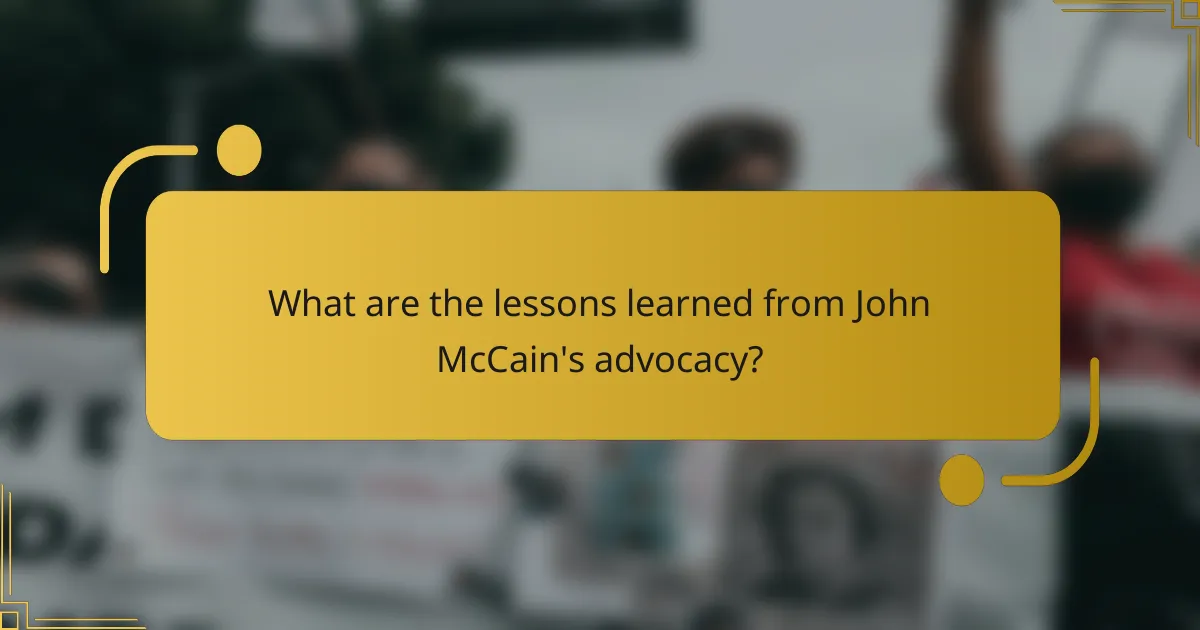
What are the lessons learned from John McCain’s advocacy?
John McCain’s advocacy highlights the significance of collaboration, integrity, and community engagement in effecting meaningful change. His approach demonstrates that effective advocacy requires a commitment to bipartisan efforts and active participation from local leaders.
Importance of bipartisan support
Bipartisan support is crucial for successful advocacy, as it fosters collaboration across party lines, leading to more comprehensive solutions. McCain often sought common ground with political opponents, which not only strengthened his initiatives but also built trust among constituents.
To cultivate bipartisan support, advocates should focus on shared goals and values. This can involve organizing joint events, facilitating discussions, and emphasizing the benefits of cooperation for the community. For example, initiatives addressing veterans’ issues often gain traction when both parties recognize the importance of supporting those who served.
Engagement with local leaders
Engaging with local leaders is essential for effective advocacy, as they possess valuable insights into community needs and priorities. McCain understood that collaboration with mayors, council members, and grassroots organizations could amplify his efforts and ensure that policies were relevant and impactful.
To effectively engage local leaders, advocates should prioritize building relationships through regular communication and involvement in community events. This can include attending town hall meetings or collaborating on local projects. By doing so, advocates can align their initiatives with the specific needs of the community, ultimately leading to greater support and success.

What is the future of advocacy in communities inspired by John McCain?
The future of advocacy in communities inspired by John McCain is likely to emphasize grassroots movements and bipartisan collaboration. His legacy encourages individuals to engage actively in civic life, fostering a culture of participation and accountability.
Emerging trends in civic engagement
Emerging trends in civic engagement include the rise of digital platforms that facilitate community organizing and mobilization. Social media has become a powerful tool for advocacy, allowing individuals to connect, share information, and rally support for various causes.
Additionally, there is a growing emphasis on inclusivity, with efforts to engage underrepresented groups in the decision-making process. Initiatives that focus on diverse voices help ensure that advocacy reflects the needs and perspectives of the entire community.
Innovative community development strategies
Innovative community development strategies often incorporate collaborative approaches that leverage local resources and talents. For instance, community-led projects that focus on sustainable practices can enhance local economies while addressing environmental concerns.
Another effective strategy is the establishment of public-private partnerships, which can provide funding and expertise for community initiatives. These collaborations can lead to improved infrastructure, educational programs, and health services, ultimately enhancing the quality of life for residents.
